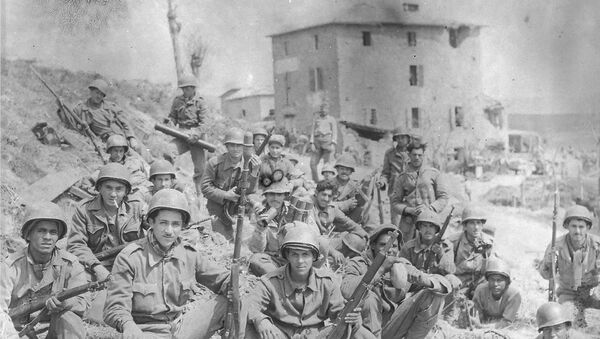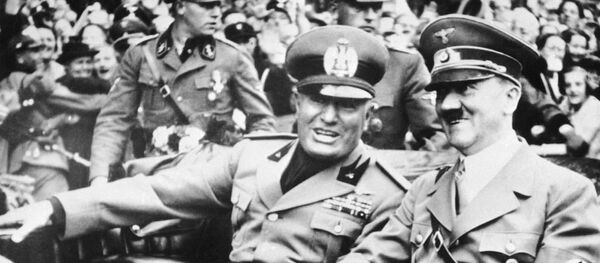Now, 74 years after the war ended on the European continent, Sputnik publishes the stories of Brazilian heroes that are so often forgotten and explains how “smoking snakes” are related to Brazil’s World War II campaign, and under what circumstances one Brazilian veteran met Soviet legend Konstantin Simonov.
READ MORE: Aerospace Servicewomen & Battle-Tested Hardware: 74th V-Day Parade in Moscow
During the first years after the beginning of World War II, Brazilian President Getulio Vargas maintained neutrality in order to be able to continue to benefit from relations with the countries from both of the opposing blocs. Vargas's “pragmatic neutrality” came to an end in early 1942, when the president agreed to the deployment of US military bases on Brazilian soil in exchange for millions in loans to establish the National Metallurgical Company.
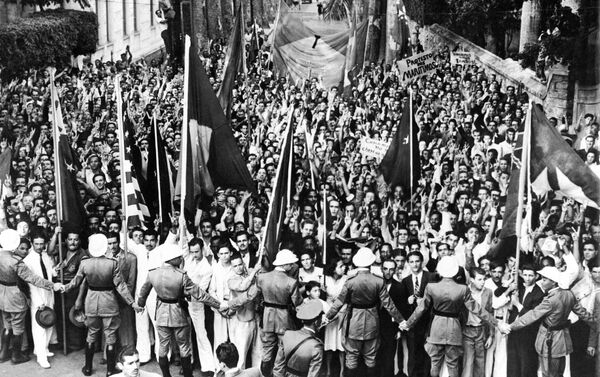
The deaths of innocent citizens forced the people to take to the streets — people demanded that Brazil must enter the war with the Axis countries. There was nothing left for President Vargas to do than to declare war against Nazi Germany and fascist Italy in August 1942.
Smoking snakes
Despite all the difficulties of the upcoming war, the “prasignas” (this is how the press called Brazilian soldiers going to the front) showed a great sense of humor when choosing an insignia for the Brazilian Expeditionary Force (BEF).
READ MORE: Adolf Hitler’s Death and Disability Insurance Policy Goes Up for Auction (PHOTO)
It showed a green snake with a pipe in its mouth. The reason is that during the Second World War there was a popular joke among Brazilians: “It's more likely for a snake to smoke a pipe, than for Brazil to fight in Europe”, which the Brazilian military used as a symbol of their campaign.
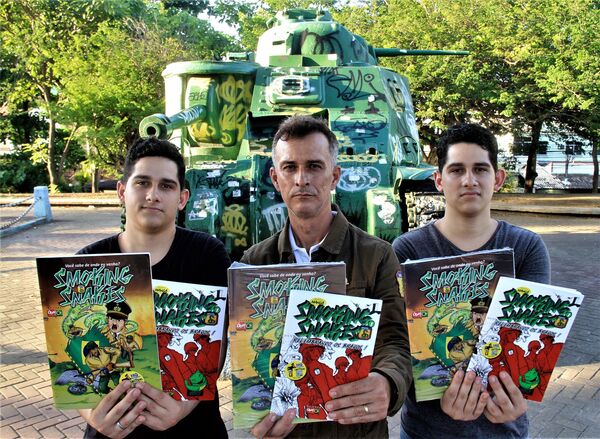
Such creativity attracted the attention of many, including famous figures and even the legendary cartoonist Walt Disney. For example, on February 22, 1945, Brazil's largest national newspaper “O Globo” decided to support the morale of Brazilian soldiers who were fighting far away from home, and published on the front page an exclusive version of the BEF emblem drawn by none other than the creator of Mickey Mouse.

To Italy!
Due to numerous circumstances, both political and operational, the Brazilian armed forces, consisting of more than 25,000 troops, went to Europe only in July 1944, only two years after Brazil formally entered the war.
“Arriving in Italy was a surprise — we made the journey, crossed the Atlantic Ocean and the Mediterranean Sea, without even knowing when and where we would fight. And only when disembarking we realized that we were to fight the Germans on Italian soil,” Lieutenant Colonel Leonel Junqueira, who left for war on 20 September 1944 told Sputnik.
The veteran, who will be 105 years old this December, signed up for the BEF as a volunteer. In a telephone conversation with Sputnik, he said that there was a threat to life even before they set foot on European soil.
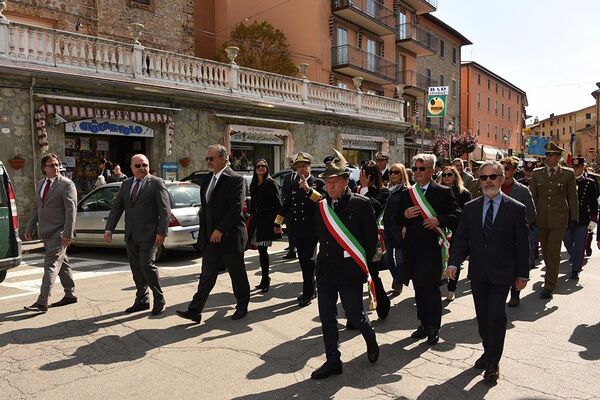
“The journey to Italy on the ship took about 16 days, although the return trip was shorter by 5-6 days. The reason is that when we were sailing there the aviation and naval crews that accompanied us repeatedly detected enemy submarines on our route. Therefore, our ship had to go around,” Leonel Junqueira explained.
When he was on his way to Italy, Leonel Junqueira was only a first-class petty officer, and, despite the fact that he was initially assigned to another branch of military service, as soon as he arrived in Italy he joined the special chemical squadron.
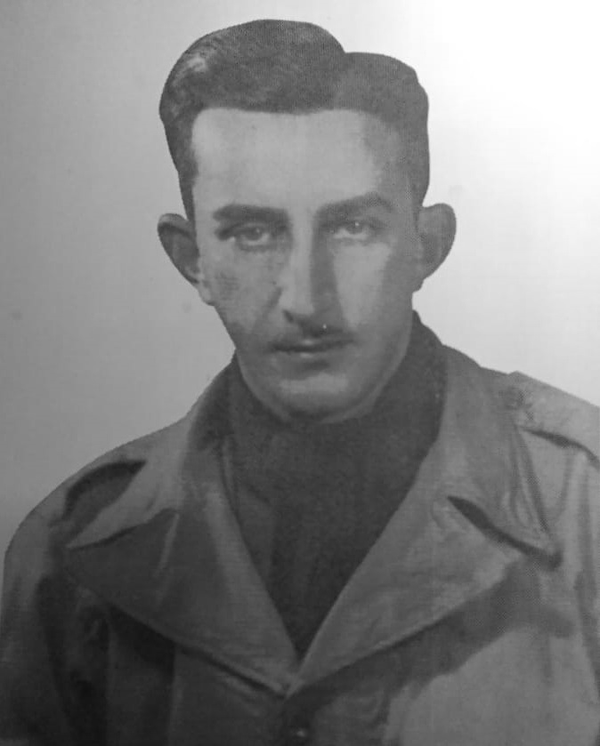
“I had absolutely no experience in this area, and, in truth, not only me, no one in our group understood anything about chemical weapons. However, we were trained by specialists from the American chemical squadrons. Our task was to use poison gases in case such a necessity occured. But, since the Germans themselves didn't use them, neither did we. Moreover, we taught other soldiers to use gas masks. What we had to constantly was make smokescreens. In those moments when the Brazilian soldiers would attack the German forces we made these smokescreens to disguise the movement of the Brazilian forces,” the veteran recalled.
Impossible to forget
Although more than seven decades have passed since the Nazi regime was defeated, many wartime memories will forever be ingrained into the memory of the old veteran.
“All the time we were there, our lives were in danger. I remember that on the second or third night after arriving in Italy, before we even started fighting, it was the first time that I had almost lost my life. I was sitting in my tent and under the candlelight was writing a postcard for my bride when a military aircraft flew over us and dropped a bomb, or rather, several bombs. My candle went out, the tent fell apart. We were lucky only because the bombs fell a bit further from where we slept. If they had fallen directly on our campground, we would have died just like that, even without stepping onto the battlefield,” Leonel said.
At that time, Leonel had already been promoted to the rank of junior lieutenant and was appointed head of the group. When the soldiers entered the house, the veteran immediately asked them to watch out for mines, because they could be anywhere. Exploring the basement of the house, the soldiers found a cellar with thirty bottles of wine. Leonel ordered no one to touch them, but someone from the group disobeyed his orders. At that moment, when one of the servicemen almost touched one of the bottles, the leader of the group shouted: “Stop! Stop!”
“I ordered to call the sergeants from the engineering group who dealt with mines. They entered the basement with a special device that immediately detected an explosive under the wine bottles. Then the engineers, with great caution, recovered a huge mine the size of a block of cheese, which, if it had exploded, would have killed us all. This did not happen to me or to my comrades, but in the next house a group of soldiers died that way,” the Brazilian veteran shared his memories, having trouble holding back his emotions.
Despite the scale of the tragedy and destruction, that only war can bring to a person, Leonel Junqueira remembers moments of joy, as well as passing pleasant meetings that he had as the troops advanced.
“We had very good relations with civilians in Italy. We quickly began to speak the language, as they taught us. And we, in turn, taught them Portuguese. And so we talked to each other. They thanked us very much. The Germans treated them very badly, and we, the Brazilians — with love. Before lunch, most of the Brazilian soldiers, before touching their food, would set aside half of what was on their plates for women with hungry children, who would come to our camp, to give them some normal food so that they wouldn't have to scour the garbage for leftovers,” the serviceman said.
READ MORE: Highlights of the 9 May Victory Day Parade in Moscow (PHOTOS)
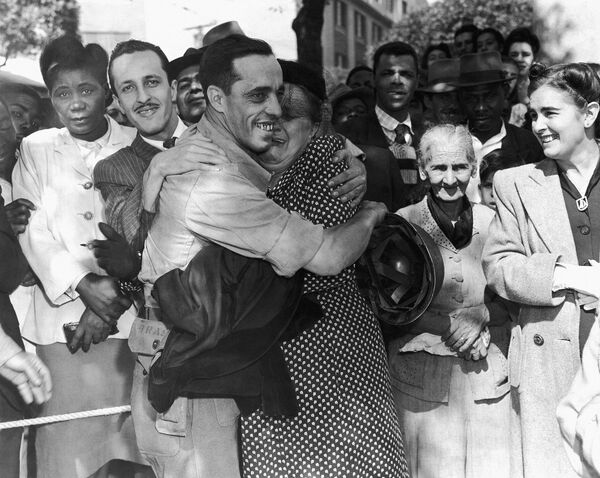
After almost a year on Italian soil, after the defeat of the Axis powers, the most long-awaited moment for all the soldiers came — the time to go home. And so, at the end of August 1945, Leonel was finally able to fulfill his dream of “returning to his homeland alive,” the hope that's forever enshrined in the words of the anthem of the Brazilian Expeditionary Force.
“On the way back, the troops on the ship were led by an artillery general. This general lived in a special cabin, and we — on the deck. Because of the heat, we only wore short pants without t-shirts. At one point, the general saw the Brazilian land on the horizon. He was in his cabin, in his pajamas, but he could not resist the joy, so he went downstairs to the deck to congratulate us. We were all half dressed, without tops on, but he came over and hugged us all one by one. And then, through laughter or through tears, he told us: “My children, we are almost home,” Leonel said, unable to hold back tears. “We all cried, laughed, these were tears and smiles of joy from returning home. It was one of the most unforgettable moments of my life.”
Meeting a Soviet legend
Talking to Sputnik, the veteran recalled how in one of the days that he had he spent in Italy, he met a Russian poet.
“In January 1945 several Brazilian journalists and we [the soldiers] sat in a bar on our day off and met a Russian poet named Simonov. While we were drinking beer, he read us a poem written for his loved ones, who were in Russia [in the USSR]. After that, he asked Brazilian journalists to publish it in our paper,” the veteran said, before reading out a translated version of the poem, which was indeed published in the “Cruzeiro do Sul” newspaper on January 7, 1945.
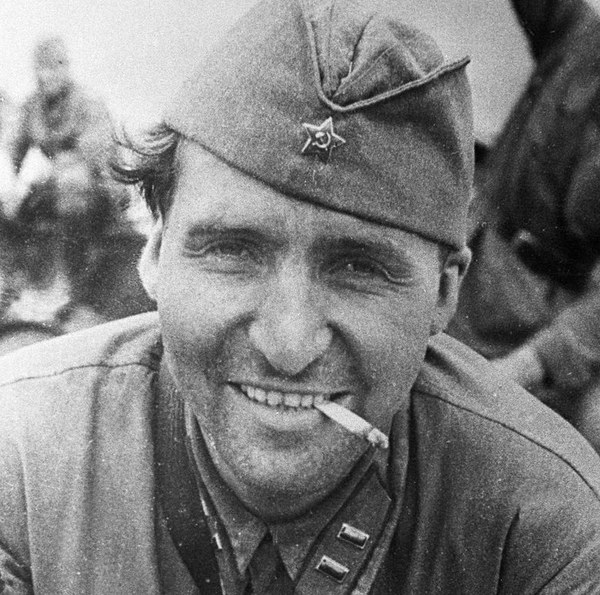
The poet that Leonel met was none other than Konstantin Simonov, the war correspondent who won many Soviet awards. The poem, which the veteran spoke of is the legendary “Wait for me and I will return…” from 1941, which became one of the symbols of the Great Patriotic War and is learned in many schools to this day.
Women's participation in the war
In addition to the 25,000 soldiers, Brazil also sent a special nursing corps to Italy. One of these seventy women was Aracy Arnaud Sampaio, who commemorated the days of these young Brazilians during the Italian campaign in her diary.
Her daughter, Maria do Socorro Sampaio, today is the chairman of the National Association of Veterans of the BEF in the Federal District and considers it one of her tasks to tell people about the heroic exploits of her mother and her colleagues on the battlefield.
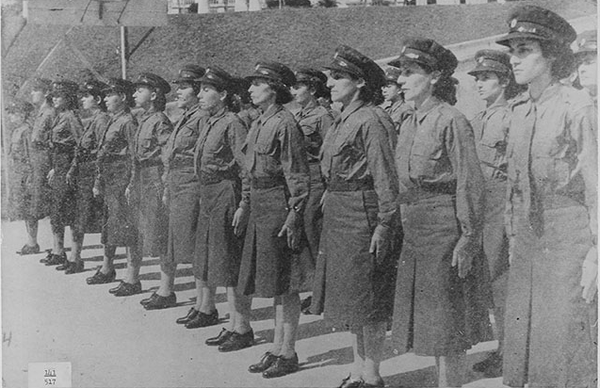
Aracy Sampaio went to the war two years later, when the Brazilian Expeditionary Force was finally sent to Italy. Unlike the military, the nurses left Brazil by plane. However, their flight was not direct: before arriving in Italy, the corps first stopped in Dakar, the capital of Senegal, then made several more stops on the African continent, and only then arrived in Naples.
“All the nurses were posted to different locations: my mother went to work at the Seventh Hospital of Livorno. It was not a field hospital, it was a large building that before the war was a boarding school. Nevertheless, the nurses still slept in tents — so my mother got seriously ill several times. Once she had to endure —20C degrees temperature, and this is despite the fact that she was used to the heat of the northeastern regions of Brazil,” Aracy Sampaio's daughter recalled.
My mother worked with such selflessness, Maria said, that one time, when she received a patient who was injured in an explosion, she did not even realize that she herself had been injured.
“Once a Brazilian soldier and an Italian partisan started to work at the hospital in order to transform a ladder into a ramp, but in the process they accidentally blew up a mine that was hidden there. Those who were in the hospital thought that they had come under fire. My mother ran into the room to help one of the patients, whose entire body was covered in wounds. She did not even realize that one of her eardrums had burst as a result of the explosion. When she left the room and went to the nursing ward, the patients told her that she was covered in blood. My mother spent 10 days in the hospital and became deaf in the left ear. And even though many other nurses were sent back to Brazil with injuries, she stayed back until the very end of the war,” Maria shared her memories with pride.
The memory of the Brazilian Expeditionary Force today
Aracy died at the age of 91, in 2008, but continues to live on not only in the memory of her own daughter. Not so long ago, Brazilian director Ruyter Curvello Duarte decided to use the notes, left by the nurse in her diaries, for a movie and made a lifetime film. The short film is called “Through the eyes of Aracy” and it will be presented to the public by the end of this year.
“This film is interesting because it sheds light on the work of the BEF nurses, which always were in the background, although they played a no less important role than the men during the war,” Ruyter explained to Sputnik.
Despite the fact that none of the director’s relatives had fought, he grew up in a military family and was always interested in the history of the BEF.
“It is very important to tell these stories, because in Brazil, unfortunately, we have is a serious problem in terms of preserving our own history, talking about it, honoring our heroes. And these stories are getting lost, fewer and fewer veterans are still alive, and we need to hear these stories now, while it is still possible,” Ruyter believes.
“This is a cultural heritage restoration project of the Brazilian participation in World War II. The idea came to us when we saw on the Internet that a [Swedish] hard rock band called Sabaton recorded a song called “Smoking Snakes” as a tribute to the Brazilians who fought in World War II. It struck me, because I understood that we, the Brazilians, are not interested in this. While some Swedes on the Scandinavian Peninsula pay tribute to the Brazilian soldiers, we do not do that,” the artist told Sputnik.
Antonio said that he also gets the younger generation involved in this work. In his opinion, this is very important in order to preserve the historical heritage.
“National memory affects the selfesteem of people, of a nation, makes them believe in themselves more as individuals, citizens, a single nation. It is important to know about the history of our ancestors. Brazilians are used to focus on the negative. Many, for example, say that BEF had entered the war closer to its end, trying to devalue the force's participation. But an end to the war is the most terrible and bloody period of any war. It's not easy to end the war, this is the most difficult period. It is at this time that a person begins to show his worst qualities, desertion and murders begin,” Antonio explained.
Brazil's contribution to the victory over fascism
So, the participation of the Brazilian troops in the Italian Campaign, although it was not on such a large-scale, still played an important role in the victory over fascists. For example, it was the achievements of Brazilian soldiers that allowed the Allied forces to break through the so-called Gothic line — the last major defensive line of the German troops along the Apennine Mountains. Despite this, stories about the heroism of the Brazilian “prasignas” are often forgotten and only told within the family circle of the veterans themselves or in the few museums dedicated to that era of history.
READ MORE: Russia's Victory Day Celebrated in New Delhi, Tributes Paid to India's Fallen
“Brazil played a very big role in the war. Most people don't talk about this, and it is very regrettable that many people in Brazil and Europe are not aware that more than 25,000 Brazilians went [to Italy] to fight against the Nazi-fascist ideology. Many don't know that Brazil is the only Latin American country that took part in the war on European soil,” Italian historian Giovanni Sulla said in an interview with Sputnik.
Sulla now lives in Montese, a small Italian town that was once the site of one of the bloodiest battles in which the Brazilian troops fought. The historian has devoted his entire life to studying the South American country's involvement in World War II and has even published a book on the subject.
“Here, where I live, in Montese and in the vicinity, many people have things that remind us of the war — helmets, uniforms — I have a lot of things of this sort in my house. When I was about 10-15 years old, I became interested in this period of history. Many told me that those soldiers came from the other side of the world. But they were not Americans, they were Brazilians. However, nothing is said about them in the history books,” Sulla explained as to why he decided to devote his career to studying this topic.
In Italy they still remember the “prasignas” and honor their role in the war. The historian said that in addition to the numerous monuments to the “liberators” (as the Brazilian soldiers were called in this region), in 2020 the residents of Montese plan to hold a big celebration on the 75th anniversary of the end of the war, including in honour of the “courage and acts of heroism by the BEF.”
“There is no doubt that the Brazilian soldiers gave the Italian population hope, and reason to smile. Italy back in 1944 was similar to today's Haiti. The Brazilian military came here not to enslave, kill, but gift democracy and freedom to Europe and to the rest of the world,” the historian concluded.

